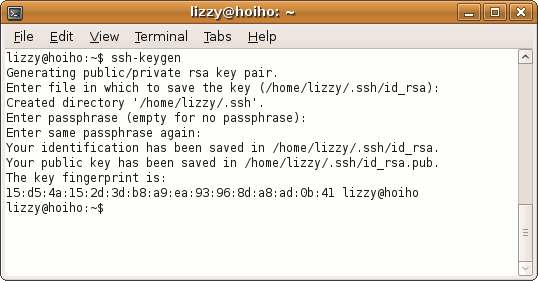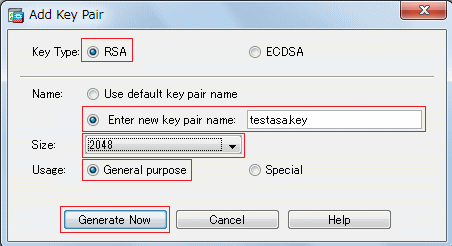Nodecrypto Generate Rsa Key Pair
Create a new RSA key pair. The algorithm closely follows NIST FIPS 186-4 in its sections B.3.1 and B.3.3. The modulus is the product of two non-strong probable primes. Each prime passes a suitable number of Miller-Rabin tests with random bases and a single Lucas test. Dummy tools to generate RSA 2048 key pair, to encrypt strings with pub key and also decrypt string with private keys - RSAKeyGenMain.java. Dummy tools to generate RSA 2048 key pair, to encrypt strings with pub key and also decrypt string with private keys - RSAKeyGenMain.java. Mar 03, 2020 Cloud IoT Core supports the RSA and Elliptic Curve algorithms. For details on key formats, see Public key format. Generating an RSA key. You can generate a 2048-bit RSA key pair with the following commands: openssl genpkey -algorithm RSA -out rsaprivate.pem -pkeyopt rsakeygenbits:2048 openssl rsa -in rsaprivate.pem -pubout -out rsapublic.pem.
- How do I make a RSA key pair for a SSH connection? Updated March 10, 2020 16:17. By Marcello Vago Instructions (Linux or Mac OS). Although many third party software packages can be used, this Lab Step uses PuTTYgen to generate SSH keys. Invoke PuTTYgen on your local Windows host. Leave the Parameters at their default values. (RSA keys, 2048.
- This is tool for generate ssh RSA key online and for free.The result of tool generation are ssh rsa private key and ssh rsa public key. Also it's called as 'generate ssh pair'. It will be two text area fileds - the first private key, the second public key. Whats is 'ssh rsa key' and why it is in use? SSH pair created for loggin through ssh.
- May 14, 2013 Generate a RSA PEM key pair from pure JS. Contribute to juliangruber/keypair development by creating an account on GitHub.
With a secure shell (SSH) key pair, you can create virtual machines (VMs) in Azure that use SSH keys for authentication, eliminating the need for passwords to sign in. This article shows you how to quickly generate and use an SSH public-private key file pair for Linux VMs. You can complete these steps with the Azure Cloud Shell, a macOS or Linux host, the Windows Subsystem for Linux, and other tools that support OpenSSH.
Note Nwn2 online cd key generator.
VMs created using SSH keys are by default configured with passwords disabled, which greatly increases the difficulty of brute-force guessing attacks.
For more background and examples, see Detailed steps to create SSH key pairs.
For additional ways to generate and use SSH keys on a Windows computer, see How to use SSH keys with Windows on Azure.
Supported SSH key formats
Azure currently supports SSH protocol 2 (SSH-2) RSA public-private key pairs with a minimum length of 2048 bits. Other key formats such as ED25519 and ECDSA are not supported.
Create an SSH key pair
Use the ssh-keygen command to generate SSH public and private key files. By default, these files are created in the ~/.ssh directory. You can specify a different location, and an optional password (passphrase) to access the private key file. If an SSH key pair with the same name exists in the given location, those files are overwritten.
The following command creates an SSH key pair using RSA encryption and a bit length of 4096:
If you use the Azure CLI to create your VM with the az vm create command, you can optionally generate SSH public and private key files using the --generate-ssh-keys option. The key files are stored in the ~/.ssh directory unless specified otherwise with the --ssh-dest-key-path option. The --generate-ssh-keys option will not overwrite existing key files, instead returning an error. In the following command, replace VMname and RGname with your own values:
Provide an SSH public key when deploying a VM
To create a Linux VM that uses SSH keys for authentication, specify your SSH public key when creating the VM using the Azure portal, Azure CLI, Azure Resource Manager templates, or other methods:
If you're not familiar with the format of an SSH public key, you can display your public key with the following cat command, replacing ~/.ssh/id_rsa.pub with the path and filename of your own public key file if needed:

A typical public key value looks like this example:
If you copy and paste the contents of the public key file to use in the Azure portal or a Resource Manager template, make sure you don't copy any trailing whitespace. To copy a public key in macOS, you can pipe the public key file to pbcopy. Similarly in Linux, you can pipe the public key file to programs such as xclip.
The public key that you place on your Linux VM in Azure is by default stored in ~/.ssh/id_rsa.pub, unless you specified a different location when you created the key pair. To use the Azure CLI 2.0 to create your VM with an existing public key, specify the value and optionally the location of this public key using the az vm create command with the --ssh-key-values option. In the following command, replace VMname, RGname, and keyFile with your own values:
Ootp 14 license key generator. If you want to use multiple SSH keys with your VM, you can enter them in a space-separated list, like this --ssh-key-values sshkey-desktop.pub sshkey-laptop.pub.
SSH into your VM
With the public key deployed on your Azure VM, and the private key on your local system, SSH into your VM using the IP address or DNS name of your VM. In the following command, replace azureuser and myvm.westus.cloudapp.azure.com with the administrator user name and the fully qualified domain name (or IP address):
If you specified a passphrase when you created your key pair, enter that passphrase when prompted during the login process. The VM is added to your ~/.ssh/known_hosts file, and you won't be asked to connect again until either the public key on your Azure VM changes or the server name is removed from ~/.ssh/known_hosts.
If the VM is using the just-in-time access policy, you need to request access before you can connect to the VM. For more information about the just-in-time policy, see Manage virtual machine access using the just in time policy.
Next steps
For more information on working with SSH key pairs, see Detailed steps to create and manage SSH key pairs.
If you have difficulties with SSH connections to Azure VMs, see Troubleshoot SSH connections to an Azure Linux VM.
Generate a RSA PEM key pair from pure JS
Cisco Crypto Key Generate Rsa
Usage
outputs
Performance
Performance greatly depends on the bit size of the generated private key. With 1024 bits you get a key in 0.5s-2s, with 2048 bits it takes 8s-20s, on the same machine. As this will block the event loop while generating the key,make sure that's ok or to spawn a child process or run it inside a webworker.
Pro Tip: authorized_keys
@maxogden found out how to use this module to create entries for the authorized_keys file:
API
keypair([opts])
Get an RSA PEM key pair.
opts can be

bits: the size for the private key in bits. Default: 2048.e: the public exponent to use. Default: 65537.
Installation
Node Generate Rsa Key Pair
With npm do
Kudos
Node Crypto Generate Rsa Key Pair
To digitalbazaar for theirforge project, this library is merely awrapper around some of forge's functions.
Node Crypto Generate Rsa Key Pair Signature V1
License
BSD / GPL